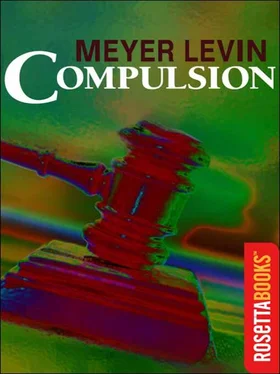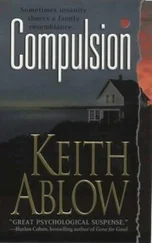And Wilk. An atheist. A defender of Jews.
Then a remark of my father’s came to my mind. When I had called home, on Sunday, his only remark about the case had been, “One thing is lucky in this terrible affair, Sid. It’s lucky it was a Jewish boy they picked.” My father, with his one yardstick. What will it do to the Jews?
It was to take me a long while to perceive the inverted, subterranean way in which there was a meaning to their all being Jewish. The immediate result of the cross-burning was a police guard set around Jonathan Wilk. Despite his protests.
Then the defence called a press conference. Wilk was sitting with his back to the windows as we filed in, but he got up at once and assumed his celebrated Lincolnesque stoop; his coat hung loosely open, and his left thumb was automatically hooked under his braces. He waved us in, the ageing speckled skin of his hand transparent in a sunny.
We were handed copies of a prepared statement. The families pledged themselves in no way to make use of their wealth to influence justice. Lawyers’ fees would be determined by the Bar Association. The families felt that the boys should be permanently removed from society; however, they hoped that their lives would be saved.
Did that mean an insane asylum? we asked. What would the defence be?
First, said Edgar Feldscher, the defence would try to assemble the facts.
Mike Prager snapped, “Hasn’t everything already been found out?”
The outward facts, yes. But a team of the very best alienists would make a study to determine the inward facts.
“Then you are going to plead insanity?”
The plea, he repeated smilingly, would depend on the study. It was to be purely scientific. Indeed, the defence still held open to Mr. Horn the offer for a joint mental study.
We took the defence offer to Horn. He laughed. “I’ve got my own alienists, the best in the business. Old Wilk is trying to pull a deal. First, a joint examination. Then he’ll offer a guilty plea. Oh, no, you can tell old Jonathan the Great that I’m not playing. I’ve got an airtight hanging case and those boys are going to swing.”
Had there been feelers from the defence? Was there a chance of a deal on a guilty plea before the Chief Justice?
“You know what the chances would be if I was still sitting up there!” Horn said ominously. He was reminding us that before running for State’s Attorney, he had himself occupied the post of Chief Justice of the Criminal Court. He was putting Judge Matthewson on notice.
The formal arraignment was to take place on the following morning, and late into the night we hovered near the Wilk apartment, still held by Horn’s angry hint that there might be a plea of guilty instead of a great show trial.
Edgar Feldscher had returned from Atlantic City, bringing two of his alienists. Willie Weiss was there too, hurrying in and out of various rooms, and from the doorway I managed to get his attention. He came out and walked around the block with me, talking incessantly. He was going to work with the defence! There was Dr. Hugh Allwin, a very advanced man who had just come from Vienna with the very latest techniques! And with him was Dr. Eli Storrs, a brilliant psychologist. “They’re really going to do a job!” he said. “Nothing like this has ever been done before. Complete psychological and physiological studies, the latest gland stuff. Wilk’s also got Dr. Vincenti, the best endocrine man alive!” The boys would virtually be taken apart, to see what made them tick.
But upstairs, I gathered, the insanity strategy was in question. Precedent alone, straight legal precedent, presented to a judge, might be the soundest approach, for no minor in Chicago had ever been hanged on a guilty plea.
On the morning of the arraignment we still did not know how they would plead. Then, as we were leaving for court, Reese beckoned to Tom. Somebody named Al Capone, the owner of a speak-easy called the Four Deuces, had just been picked up for shooting a top gangster named Joe Howard. A new kind of cold-blooded killing. The car had simply swept past Joe Howard on Clark Street, and he had been shot full of holes.
Tom hurried to police headquarters and I went on alone to cover the arraignment of the boys.
As word spread that the thrill killers would appear, there were scuttlings from all the corridors; from nowhere, the courtroom filled.
The boys were brought in. It was Artie’s nineteenth birthday, and the sob sisters were ready. Had he received presents from his best girls? From Myra Seligman? From Dorothea Lengel?
Artie smiled teasingly. Other questions came, for both. What was jail life like? Would they prefer hanging to life sentences? And they replied courteously, but like a vaudeville team, “We must respectfully decline to answer upon the advice of counsel,” smirking at their lawyers.
We laughed, and then for an instant they bent their heads together, and Artie came out of the huddle, grinning. “We have a statement, fellows.” We all bit, readying our notepaper. “The sun is shining,” said Artie. “It is a pleasant day.” So we laughed again and noted that they had recovered their friendship and their bravado.
The judge entered. It was the Chief Justice himself. In certain events, chance seems to exert itself to choose the proper persons, as if there were an ordainment to show mankind from time to time a complete symbol. So in this case Judge Matthewson had precisely the bearing for his rôle He had the fullness of years, but with no suggestion of frailty of age.
The clerk called the case.
Horn and his staff had prepared a formidable indictment, for felonious assault, murder by strangulation, kidnapping with intent to kill – everything – as if afraid of some wizardly loophole evasion. But Wilk sat relaxed, loose, with no papers before him. When the time came, he and Ferdinand Feldscher stood, one on each side of the two boys, as they were asked, how did they plead?
“Not guilty,” said Judd, as though answering a classroom question, and Artie said, swallowing his words, “Not guilty.”
Horn was smiling. He would have his chance to take on the great Jonathan Wilk before a jury. The judge set the day, a few weeks ahead.
Wilk pleaded for a delay to prepare a defence. “The defence needs no more time than the prosecution!” Horn cried.
Edgar Feldscher pointed out that complex medical and mental examinations had to be made. The Chief Justice kept gazing at the boys. “The best I can give you is an extra week,” he said.
I phoned the news and hurried in to write my feature. But instead of writing about Artie’s birthday I found myself impelled to write of Judd’s father, sitting there in the courtroom. I’ve come across that story, in the files:
Judah Steiner, Sr., a man with grey hair, sat in Judge Matthewson’s courtroom today for an hour. He did not move. The other men spoke, even smiled, gestured, disputed. Judah Steiner sat quite still…
Occasionally he put his hand to his ear. He was not angry, he was not weeping. He was merely trying to understand this thing. His son had killed someone. For no reason at all, and for the reason of some philosophy that he couldn’t understand. He had always thought his son was brilliant…
People were staring first at him and then at his son, noticing the same cut in the yellowing lips of the father and the firm, red lips of the boy. People were noticing the same contour of forehead, the same balance of cheek.
Then they came to him with questions. What did he think? What did he have to say?
He had only one sentence. “Why do you come to me? I – I have done nothing.”
I have done nothing . Today, the words echo ironically. But even then they set me to wondering.
I would speak to Myra, who knew the families well.
Читать дальше












